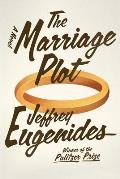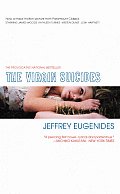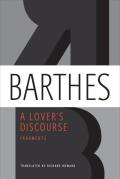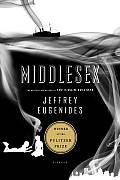
Jeffrey Eugenides has written one of the most anticipated books of the year.
The Marriage Plot, his third novel, after his beloved debut
The Virgin Suicides (1993) and the Pulitzer Prize-winning
Middlesex (2002), is an in-depth psychological, intellectual, and spiritual exploration, as well as a complicated love story. Eugenides writes from the point of view of three characters in their last year of college and first years out in the world thereafter: Madeleine, an English major who studies 19th-century novels before switching to semiotics; Leonard, a brilliant but manic-depressive philosophy student; and Mitchell, who travels through Europe and India in search of answers to ultimate questions. Cracklingly intelligent and beautifully written,
The Marriage Plot is a page-turning meditation on the nature of love.
÷ ÷ ÷
Jill Owens: How did The Marriage Plot begin?
Jeffrey Eugenides: The book began from another book I was writing. I started another novel in the middle of writing Middlesex, during a period when I was having trouble with Middlesex. That novel was about a family that was holding a large party. Lots of people were coming home to attend the party, and the book was told from the points of view of many different characters. Three of those characters were the characters who finally ended up in The Marriage Plot. There was Madeleine, who was one of the daughters in this family. Mitchell was haunting the precincts and was in love with Madeleine. And she also had a boyfriend, who was manic-depressive.
I thought that they were going to be part of that book, but as I began writing her story, in a section that I thought would only be a few pages long, I became involved in imagining her and thinking about her. I kept writing her story until I had about 80 or 100 pages. Something about the section and something about the prose of that section felt fresher to me, and more energized, and I liked it better than the novel I was already at work on.
The novel that I was at work on felt a little bit old-fashioned and smelled like a sofa you got from the flea market. It had been troubling me. Though it was a perfectly good piece of furniture and I could sit on it, I wasn't sure if I wanted it in my house. [Laughter] When I hit upon Madeleine's story, and started writing about college and semiotics, the book became contemporary to me, and I just kept pursuing her story. I had to separate those three characters out of the other manuscript and write their stories and somehow come up with a novel that contained the three of them.
Jill: All three of your novels have had very different narrative perspectives. Did it feel very different for you to be writing in the third-person limited point of view?
Eugenides: Certainly it was a natural progression for me. I felt by the end of writing Middlesex that I was better able to plumb the psychological depths of a character. In that case it was the narrator. In the last half of Middlesex, it becomes a modern psychological novel, and it was a kind of springboard for me to go into this novel where I had close third narration on three different characters. I was very eager to do that, to present the life of the mind of three different people as accurately and fully as I could.
Jill: What were your first experiences with semiotics like?
 Eugenides: I was much more of a modernist than Madeleine is. I was not a devotee of the 19th-century novel as an undergraduate and was more of a Joycean. So, I was probably temperamentally more disposed towards taking semiotics than she is. But some of the way I described her reactions are not so different from my own. I noticed that other people were reading Derrida and Barthes before I began reading them, and I noticed that those people were kind of the hip clique on campus, especially compared to the somewhat dreary English seminars that I was taking. So, I began taking a high-level semiotics theory course to find out what all the fuss was about. I had probably less difficulty dealing with it than Madeleine does. But, yes, my first experience was senior year of college, when I really started reading seriously at all.
Eugenides: I was much more of a modernist than Madeleine is. I was not a devotee of the 19th-century novel as an undergraduate and was more of a Joycean. So, I was probably temperamentally more disposed towards taking semiotics than she is. But some of the way I described her reactions are not so different from my own. I noticed that other people were reading Derrida and Barthes before I began reading them, and I noticed that those people were kind of the hip clique on campus, especially compared to the somewhat dreary English seminars that I was taking. So, I began taking a high-level semiotics theory course to find out what all the fuss was about. I had probably less difficulty dealing with it than Madeleine does. But, yes, my first experience was senior year of college, when I really started reading seriously at all.
Jill: I love Madeleine's reaction to a fellow semiotics student. She thinks that he sounds "both insightful and horribly wrong. It may have been true, but it shouldn't have been."
Eugenides: That kind of encapsulates the whole novel, and certainly Madeleine's character, because I think she's intelligent enough to understand that it's possible that romance and love are a social construct, and much of our attachment to those ideas isn't really a true thing. And, yet, at the same time that she knows that from reading Roland Barthes, she's still desperately in love with Leonard. So, some things can seem true and also horribly wrong. Many of the pessimistic conclusions of structuralist theory always struck me that way. They certainly strike Madeleine that way.
Jill: How did you decide to include Roland Barthes's A Lover's Discourse as a framing device? I've read a little Barthes, but not that book. Your book both made me want to read it and a little afraid of it.
Eugenides: You don't need to be afraid of that book, I don't think. It's probably the juiciest of all those books. I can't remember exactly. I just remember I started writing about Madeleine and college and semiotics, and then I recalled what books we were assigned, and suddenly there it was, A Lover's Discourse. I'd already been launched on a love story, so it just seemed to be the appropriate source text. And Roland Barthes was always my favorite of the semioticians. He was just a charming writer that I always liked. So, I was happy to go back and re-immerse myself in Barthes.
Just by chance, Farrar, Straus, and Giroux has been reissuing all of the Barthes from the '70s in these lovely new editions. They actually asked me to do an introduction for one of them, but I thought, I'm writing enough about Roland Barthes right now; I'd better keep it in my novel. [Laughter] But I think it's great that there are these new editions, and I would be very pleased if anyone reading The Marriage Plot felt compelled to go back to Barthes, or to discover Barthes.
Jill: I would not be at all surprised if that were the case. How did you get launched onto the love-story aspect?
 Eugenides: All my books are love stories. The Virgin Suicides is a twisted love story. [Laughter] But it is a kind of love story. And large swaths of Middlesex are a love story. The Obscure Object, for example.
Eugenides: All my books are love stories. The Virgin Suicides is a twisted love story. [Laughter] But it is a kind of love story. And large swaths of Middlesex are a love story. The Obscure Object, for example.
Jill: You did an interview with Powell's when Middlesex came out, and in that interview you said, "If I were an emotion, I would be longing." Is that still true?
Eugenides: That quote gets thrown back at me now and again, and no quote makes me blush and cringe more than that quote. [Laughter] It's just how it sounds. I feel like if I talk about the quote, it's just more gas in the tank. So, I'm going to stay away from it.
Jill: Fair enough. [Laughter] When you were talking earlier about how energized Madeleine's story felt when you were writing it, it really brought me back to that time in my early 20s, when everything is suffused with such intensity, intellectually and emotionally. How did you tap into that intensity?
Eugenides: I guess I just remember it very vividly. Some people will ask, Why did you set the books in the '80s? Or, What is it about college? Or, Did you have to do some research to remember what the '80s were like? [Laughter] For me, it was like it was yesterday. I think it usually is when you think about your 20s. Everything was at such a high pitch. Intellectually, you're learning an amazing amount, reading an amazing amount, and you're discussing these books with your friends. That's not always the case now, when we seem to read more solitarily, and maybe discuss our reading now and then. But that time is kind of a hothouse of reading and talking. Then that gets all bound up with perhaps the first great love affair that you've had or the most intense desire that's unfulfilled that you've ever gone through. College is full of all of that. You're old enough to make decisions, to be on your own, and yet you're totally confused. It was easy to re-enter that atmosphere, and I enjoyed having characters who were intellectually fully formed but also unsure of themselves, confused, and passionate about what they thought and who they loved. I think those are fun characters to be around and to animate.
Jill: I was interested by all three stories, but as I was talking about the book to a friend the other night, I found myself realizing that I was really glad you included the story of Mitchell's spiritual struggles and growth. I think that's an aspect that often gets left out of coming-into-adulthood books. Why did you want to include that?
 Eugenides: I guess there are a couple of answers to that. The first is that in writing The Marriage Plot, I was aware that I was dealing with a number of traditional novelistic themes. I wasn't trying to just resuscitate them or replay them, but I felt the characters were in touch with them. Aside from the marriage plot, it seemed to me that 19th-century novels used to deal with the search for truth, or God, or some kind of spirituality. The best example of that would be Levin in Anna Karenina and his search for some kind of religious meaning to his life.
Eugenides: I guess there are a couple of answers to that. The first is that in writing The Marriage Plot, I was aware that I was dealing with a number of traditional novelistic themes. I wasn't trying to just resuscitate them or replay them, but I felt the characters were in touch with them. Aside from the marriage plot, it seemed to me that 19th-century novels used to deal with the search for truth, or God, or some kind of spirituality. The best example of that would be Levin in Anna Karenina and his search for some kind of religious meaning to his life.
I always loved reading about such things in older novels, and I find that spirituality, for lack of a better term, is curiously absent in the modern novel. As though this no longer pertains to us and that question has completely been answered, or we've all decided to ignore it. And yet I don't think it's true about people. It's certainly not true about Americans, many of whom remain religious, and even people who aren't religious are still puzzling out why they're here on earth. So, those questions, as I recall, were extremely potent ones in my early 20s, and it just seemed natural that at least one of the characters would be obsessed with them.
There are also psychological reasons for Mitchell's interest in mysticism. There is the whole question of him wishing not to have a body. Because the body was the locus of so much of his pain and longing, to bring that word back, he wishes almost not to be a physical being, because of his unrequited love. So, dramatically and psychologically, it made sense for him to do it, and I also thought that it accorded with the kind of life I was writing about.
Jill: Did you go back and read some 19th-century novels in doing research for this book?
Eugenides: Not too much, because I was never concerned about writing a marriage plot. I mean, a traditional marriage plot would only be from the point of view of the heroine, and you would see the other suitors coming up and bothering her. [Laughter] I didn't want to write a Jane Austen novel; I wanted to write a contemporary novel about a character who loves Austen, or Henry James. I didn't need to go back to them to find anything out. I wasn't going to repeat that.
Jill: I read in your recent interview with the New Yorker that you volunteered at Mother Teresa's Home for Dying Destitutes, like Mitchell. How did you decide to include a version of that experience in writing this character?
Eugenides: I've been trying to write about that experience almost from the time it happened, which was 30 years ago. I've written a couple of short journalistic pieces about it, but I've never been able to do it adequately, or to find the right place in a novel for it. Obviously, once Mitchell had this interest in religion, it suddenly made sense for him to end up going to Mother Teresa's. So, I wrote that chapter.
I think it's about 40 pages in the finished novel, but that section took me longer than any other part of the book. At one point it was over a hundred pages long, because I made the mistake of including so much of my personal memory of that time that I couldn't find the proper dramatic shape for Mitchell's story. So, I had to write and write, and then cut out most of what I'd written, to try to find out the kind of story I needed for this book.
Jill: What made you decide to have Leonard's character be manic depressive? I'd imagine that was a less common diagnosis 30 years ago than it is now.
Eugenides: Well, it wasn't so uncommon. They called it manic depression, and not bipolar disorder, like they do today. When they started calling it bipolar, it seemed to suddenly be everywhere. But there were a number of people in college who were manic depressive. I didn't know any of them well, but heard stories from people about them. I remembered that. And then thinking back, I recalled a certain number of people who had committed suicide while I had been at college and that they probably had been manic depressive. So, it all kind of came back to me.
Jill: How did you think about tone? The book is funny, serious, honest, and ultimately, I thought, very kind to all its characters.
 Eugenides: Tone is really everything, and usually I have to go through a great struggle with each of my books to find the right tone. The tone of this book came with a sentence which I think is now on page 19: "Madeleine's love troubles began at the time when the French theory she was reading deconstructed the very notion of love." From the tone of that sentence, I guess I sensed a lot of the things that you just mentioned. There's a kind of humor to it. There's a college seriousness, as well as a slight mocking of that seriousness. There's also a genuine interest in the central conflict of the book, which is between her romantic feelings and what she knows in her head might counsel her not to be so dreamy. So, everything seemed to be in that tone. It was a colloquial sound that I felt was close to Madeleine's own way of thinking ? slightly breezy, but hopefully not too cheap. And when I wrote that line, I felt what the book would be.
Eugenides: Tone is really everything, and usually I have to go through a great struggle with each of my books to find the right tone. The tone of this book came with a sentence which I think is now on page 19: "Madeleine's love troubles began at the time when the French theory she was reading deconstructed the very notion of love." From the tone of that sentence, I guess I sensed a lot of the things that you just mentioned. There's a kind of humor to it. There's a college seriousness, as well as a slight mocking of that seriousness. There's also a genuine interest in the central conflict of the book, which is between her romantic feelings and what she knows in her head might counsel her not to be so dreamy. So, everything seemed to be in that tone. It was a colloquial sound that I felt was close to Madeleine's own way of thinking ? slightly breezy, but hopefully not too cheap. And when I wrote that line, I felt what the book would be.
Jill: Your language, in this book and your other books, has some really wonderful imagery and metaphor. I loved the description, "a Paleolithic graduate, a bog person of an alumnus enfolded in a preppy blazer," to pick just one example in The Marriage Plot. How do you think about your prose?
Eugenides: I spent the greater part of my early career just thinking about prose and language. I think The Virgin Suicides is a book that really relies on its voice. The novelists that I admired when I was starting out were writers like Nabokov and Martin Amis ? stylists, really. Not entirely, but obviously it's their prose style that they're known for, and that gives you so much pleasure to read. So, that's how I started out, just trying to figure out how to write a decent sentence, and I was taught by John Hawkes at Brown, who was a stylist himself. He made me very attentive to language and clichéd lines and what bad writing is. But I spent a lot of time thinking about that early on.
I'm glad that you found things like that in The Marriage Plot, because I didn't find it any easier to write this book. But I was letting the language recede into the background a bit so that the characters could come to the fore. It's not as showy a style as my other books, but the words I was using often felt like the right words, and I felt a kind of honesty in the prose of this book. I was able to really say what I felt and come as close to the truth about people as I was able to do. Some of the poetry, some of the lyricism and the ornament, fell away for something that felt purer and truer to me, though not completely unadorned.
Jill: I was curious about the dedication of the book, "For the roomies, Stevie and Moo Moo." [Laughter] I'm assuming maybe Moo Moo was Rick Moody?
Eugenides: No, he wasn't.
Jill: Ah! I had read that he was a roommate of yours at one point, so...
Eugenides: Yes, he was, but that was after college. I was wondering who the appropriate dedicatees would be for this book, and since it's about the end of college, it's to my college roommates, two guys, one of whose nickname is Moo Moo. I was including that to suggest the continuing sophomoric nature of our friendship. [Laughter]
Rick Moody was called "Moodman." That was his nickname. Moo Moo was a different guy. I lived with Moo Moo a lot longer.
Jill: You've talked about this a bit in some ways, but how do you think your writing has changed over the years?
 Eugenides: This book is much more about character and novelistic creation of character. Middlesex had some of that, but it's really concerned with a lot of plot moves and comedy, and The Virgin Suicides is a kind of atmospheric, lyrical novel, so my writing has changed in that way. To me, it psychologically felt like it had been deepened or matured, as I hope it would, as all those years have passed and I've gotten older.
Eugenides: This book is much more about character and novelistic creation of character. Middlesex had some of that, but it's really concerned with a lot of plot moves and comedy, and The Virgin Suicides is a kind of atmospheric, lyrical novel, so my writing has changed in that way. To me, it psychologically felt like it had been deepened or matured, as I hope it would, as all those years have passed and I've gotten older.
Jill: You do have a somewhat long time between publishing novels. Is that because of something about your writing or revision process itself?
Eugenides: It's terrible to admit that I'm always working. It's not as though I'm taking five years off to sail around the world, or something like that. [Laughter] And, of course, if I could write a book in two years, I'd be happy to do it. It's funny that people would think otherwise, like I'm on some kind of plan. But with this book, as I said, I worked two or three years on the other novel before this one came out of it, so there you go right there ? this one took about five or six years, and the other one took a couple. I have a book of short stories almost finished that I was writing during this, so there are other things going on. Maybe I'll get lucky with one of these, and I'll just be able to work steadily through and be a little quicker. I'm always surprised that the time is flying by, because I'm always working on the same book and agonizing over it and spending a lot of time revising.
I think what takes me a long time is that the events that are happening to the characters almost have to happen to me. I'm living the book out as they're experiencing it. When I'm writing a section, sometimes I'm trying it 5, 10, or 15 different ways until I find the one that feels right. The language might be right, but the kinds of things they say or the decisions they make might not be right. It's not always easy to predict what they should do that quickly. I have to bathe in what's going on in the book to figure out what's right. Also, I'm a little uncertain about my decisions. So, sometimes I'll have the right strategy for a scene on the second draft, but I won't trust that, and I'll write 10 other drafts in order to convince myself that number two was the right solution. There's a lot of one step forward, two steps back, at least in my writing.